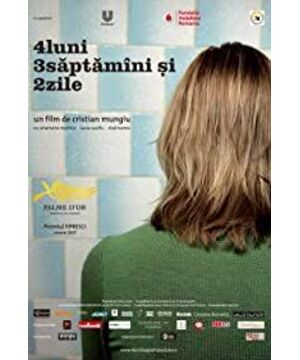- Andrei Tarkovsky, "Carving Time
" "April Three Weeks Two Days" is such a film that starts from the psychological state of the characters, and brings out directly observed real events and their unique textures through the inner power of the situational atmosphere. A single clue, a single protagonist, and a linear narrative technique condensed in one day, through the control of the narrative rhythm, the pre-set suspense is slowly released one by one, and the characters' inner anxiety is disturbed. Complementing the dark and bleak story scenes, the implied emotional tension draws the audience all the time, following the characters to experience the suffering of life and inner torment.
"We have to show the story to the audience, not tell the story, we have to respect the intelligence of the audience." Robert McKee explains the principles of story design for the screen. "Three Weeks and Two Days in April", from the beginning to the end, we are always restrained by the suspense contained in the image, what are these two girls going to do? Why go to a hotel to book a room? Why do you want to meet that strange man? Why do men pretend to be hypocritical to avoid abortion? Did the abortion go well? Can she successfully discard the aborted fetus? Through the appropriate choice of story materials and concise editing, accurate scene scheduling and perfect shooting methods, the director shows us a real story, a real life.
Explaining his directorial intentions, director Christian Mongi said: "I try to make a film about the characters and the story, not about the era, that's not the context and the theme of the film, I try to be as respectful as possible. And restore the facts." Under the social background where contraception and abortion are illegal, Gabita, who was unfortunately pregnant out of wedlock, is most anxious and concerned about solving the trouble as soon as possible and secretly. So about how Gabita was pregnant, who is the father of the child, why he has not appeared... A series of details that have nothing to do with the character's current situation are all deliberately hidden by the director. The protagonist Otilia is a person full of love and responsibility. At the beginning of the film, a small detail is used to explain Otilia's character. In the hallway of the dormitory, she saw the two kittens brought back by her classmates, and turned around and went back to the dormitory to take milk powder and send them to the kittens. This seemingly insignificant episode was the result of Otilia disregarding her menstrual period. , For the sake of his friend Gabita, he stepped forward and used his body to make a deal with the rogue doctor. Rough picture quality, rudimentary lighting, real ambient sound effects, and real emotional experience all reproduce the story realistically, all of which make us feel the sincerity of the director.
The imagery of the film is shocking, based on a near-real experience of the characters' emotions. In order for her roommate Gabita to successfully perform an abortion, Otilia accepted the threat of a travel doctor and prepared to have a relationship with her. The embarrassed Gabita walked out of the room with shame and gratitude and closed the door. The torture made this waiting time extremely difficult, Gabita asked for a cigarette from the strange man in the rest room, but the cigarette failed to calm her down, and her trembling fingers revealed her inner panic; , had to go back indoors, hid in the bathroom, sat on the toilet to smoke, turned on the water hose... Immediately, Otilia rushed into the bathroom naked and went straight to the bathtub, flushing herself with her back to the audience, Gabita After wringing out the cigarette in her hand and walking out of the bathroom, Otilia was still washing her back, the water was rushing, she turned off the water, sat on the edge of the bathtub, her back was silent for a long time, it was very quiet, only the clock was dripping The sound of ticking echoed around... The emotions surging in the hearts of the characters at this time immediately flowed into the hearts of the audience! Water can cleanse the dirty body fluids, but cannot wash away the humiliation of injuries. The brain is blank, the boundless nothingness is diffused, and the situation where everyone has to be dominated by the environment from the body to the heart truly affects the soul of every audience!
The long shot "allows one to understand everything without breaking the world into a pile of pieces, and it reveals the meaning hidden in people and things without disturbing the original unity of anything." Andre Ba Zan said.
Gabita was temporarily settled, and Otilia rushed to her boyfriend's mother's birthday party. The director used an extra-long shot here to express Otilia's helplessness, impatience, and incompatibility with the environment. The camera was fixed in front of the dining table, and Otilia was placed in the center of the frame. At first, she was still reluctantly eating, and occasionally had a few conversations with the guests at the table. Later, she stopped eating, and her smile began to stiffen. Don't pay attention to it, think about your own business, while the guests at the table are always arguing hotly, and the camera stubbornly does not move until the audience starts to get bored! As audiences, we have experienced the unspeakable pain in life together with Otilia, and our hearts, like her, are worried about Gabita, who is still in the hotel waiting for her miscarriage, but we have to be like her, helpless Crammed into a cramped space and a bunch of unfamiliar faces, let the noisy chatter intrusive and restless! This beautiful long shot is arguably the best interpretation of Andre Bazin's argument.
Starting from the psychological state of the characters, the scenes in which the dramatic tension is slowly released through the inner power of the atmosphere of the scene are all bowed down. In the process, under the absurd and helpless reality, life continues tenaciously in anxiety... Simple directing techniques, not simple scene scheduling, do not please the audience with the pleasure and beauty of the movie viewing process, but let the audience feel After experiencing and participating with the characters, and after the audience's silent contemplation, the audience's delayed outburst of identification produces stronger emotional arousal. Similar themes, when they arrived in the United States, they became the giggling and heartless little pregnant woman "Juno", with a perfect ending that was almost a fairy tale. "April Three Weeks Two Days" PK "Juno" fully confirms the huge difference between Cannes's aesthetic taste and Oscar's value orientation. Undoubtedly, "Three Weeks and Two Days in April" leaves the audience more space for reflection and reflection, about them, about society, about themselves...
At the end of the film, when everything ended like a nightmare, they were exhausted, sitting relatively speechless at both ends of the dining table. The background was a happy wedding. Leah, sometimes sweeping across Gabita, gradually zooming out, Otilia turned her face and smiled slightly at the camera. Unfinished business, stop abruptly! Hardships and adversities have been passed, and life has to go on. Although everything I have experienced is absurd, I have to knock down my teeth and swallow my blood. It is better to give the pain and time, and let the passage of time slowly heal the wrinkles in my heart. . Since you choose to live, it is better to face it with a smile!
Regarding the movie, there are still many places that can be commented on. Out of respect for friends who have not watched the movie, I leave it to you to experience it yourself.
View more about 4 Months, 3 Weeks and 2 Days reviews










